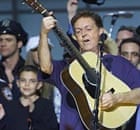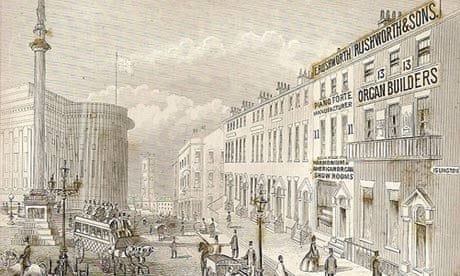Business history is too little celebrated, alas for the north, whose annals of industry and enterprise have often ended up on bonfires or skips.
Occasionally that may have been because the management didn't want every jot and tittle of their financial dealings to see the light of day; but the result has too often been a lop-sided view of how money is made – the risks and challenges obscured by the rather more obvious rewards of firms which went on to success.
So hooray for Liverpool University which is launching a three-year research project into the port's music business Rushworth's, whose influence stretches from Oxbridge college organs to Paul McCartney's first guitar. The latter still needs absolute corroboration – the words 'is thought to have come from Rushworths in exchange for a trumpet his Dad had bought him' are usually used. But there is no doubt about John Lennon and George Harrison's Gibson J-160E guitars which the company imported specially from Chicago and handed over in 1962.

The research will follow the story of Rushworth's from 1828 when it was founded as an organ-building works to 2002 when it finally ceased trading. Current family member Jonathan Rushworth, a Liverpool graduate, hopes that the exercise will be a communal rather than ivory tower event. He says:
I am sure that there are many Liverpool people who have memories, recollections and experiences of the music premises in Whitechapel and Islington or the organ-building side of the business.
That's Liverpool's Whitechapel and Islington btw, if you are reading this down south. Jonathan goes on:
Many people may also have experience of the programmes and initiatives which Rushworth's organised to support and encourage music in the city. This project is a great opportunity to capture the memories of those who worked for, visited, dealt with or supported this famous Liverpool family music business.
Nicholas Wong, who is leading the research project into an institution which in the 1960s declared itself, without rivals' objections, to be 'Europe's largest music house' , says:
Over its long history touched and influenced many people. I urge members of the public to get in touch with me to share their memories, materials or experiences of Rushworth's music shops and business.
The project is likely to show in detail how Liverpool's famous musical tradition didn't just come out of the Mersey, the dockland shanties or the sea air. Rushworth's benefited from it but nurtured it in turn, running events such as the annual brass quartet contest and a music and poetry festival which became Liverpool Festival of Music, Drama and Dance. The Merseyside Music Teachers Association worked through the firm's teaching scheme in the 1970s and Eighties to rent instruments to parents and arrange tuition at affordable prices. The William Rushworth Memorial Trust, set up in 1944, made and still makes grants to meet shortfalls for this and similar music study and appreciation courses.

Comments (…)
Sign in or create your Guardian account to join the discussion